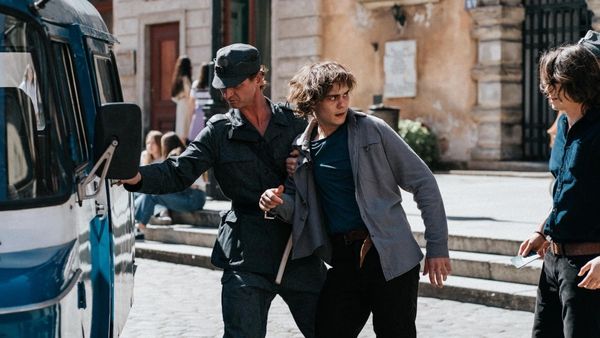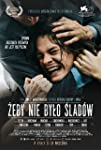Eye For Film >> Movies >> Leave No Traces (2021) Film Review
Leave No Traces
Reviewed by: Amber Wilkinson

The brutal regime of early 1980s Poland is explored through a fictionalised version of the true story of student Grzegorz Przemyk (Mateusz Górski), who was beaten to death by the state militia in 1983. The way the murder happens, like a bolt from the blue, is just the first shock in a film that repeatedly shows us just how much energy despotic regimes can be prepared to expend in order to achieve the result that they want.
Grzegorz is simply hanging out with his friend Jurek Popiel (Tomasz Ziętek), when a bit of horsing about too far sees them approached by the police. When Grzegorz – who is the son of opposition firebrand and poet Barbara Sadowska (Sandra Korzeniak) – refuses to show his ID. Despite being something that should no longer be compulsory after the suspension of martial law, the pair are nevertheless bundled off to the police station. It’s there that Jurek witnesses his friend battered, not just with deadly intent, but, after a senior officer notes they should avoid his back so they don’t leave a mark, with a sadistic care.

Although surviving in the short term, his injuries are severe and Grzegorz dies soon after, leaving Jurek in the unenviable position of being the only honest witness. Jan P Matuszyński then gives us chapter and verse on what happens next, flipping between the dusty room machinations of the state and the inescapable hell Jurek finds himself in. If Matuszyński’s film tends towards soap opera in places and could definitely do with a trim here and there, its long running time does allow the grind of what happens next to play out in ways that emphasise the sheer slog of it. Rather than simply take the bad publicity hit of “a couple of bad apples” on the force, the regime, spear-headed by General Cleslaw Kiszczak (Robert Więckiewicz), instead goes to increasingly elaborate lengths to try to make the story go away. With the case gaining profile, it’s not as simple as making Jurek conveniently disappear, and soon all the despotic drivers come into play, from attempting to discredit him as a witness to attacking his loved ones and, finally, infiltrating his family.
While its bad for Jurek, it’s also no less dangerous for the pair of hapless orderlies who took Grzegorz to hospital and who find themselves with targets on their back as a convenient alternative to blaming the police. The amount of detail presented by Matuszyński works for and against the film, which was Poland's nomination for the non-English language Oscar this year. The look is immersive, with curls of cigarette smoke clouding almost every room and the oppressive atmosphere has a relentless quality, no matter where Jurek finds himself. A subplot involving Jurek’s father’s (Jacek Braciak) staunch belief in the regime and his gradual realisation of his own moral compromises offers some human drama against the bigger machinations of state and you can’t help but wish that Matuszyński had chosen to cut down on a few of the chapters here to let strong verses like this sing out. Still, although this is a long watch it’s never less than engrossing as we see just how far the state is prepared to twist to ‘straighten things out’, something which goes beyond a simple Polish history lesson to have implications elsewhere in our modern world, where politicians all over the globe still show a desire to interfere with the independence of the judiciary.
Reviewed on: 10 Jun 2022

















